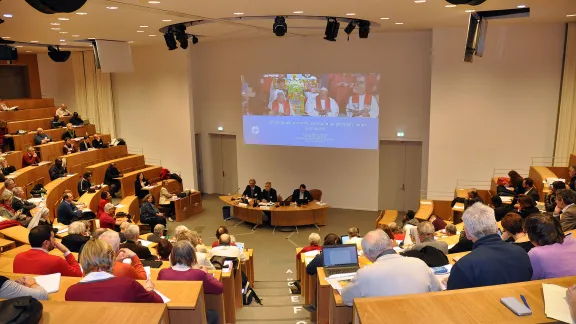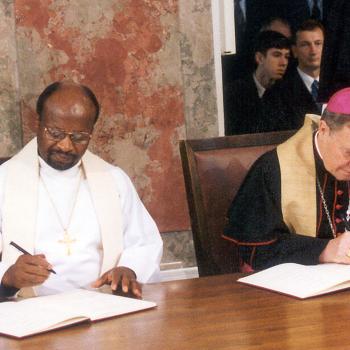
Participants attending the Colloquium at the Paris Institute for Advanced Studies in Ecumenism listen to LWF General Secretary Rev. Dr Martin Junge giving his keynote address. Photo: Ivan Karageorgiev/Unité des Chrétiens
Ecumenical encounter explores ways the agreement continues to inspire dialogue between different Christian churches
(LWI) - To mark the 20th anniversary of the Joint Declaration on the Doctrine of Justification by The Lutheran World Federation (LWF) and the Roman Catholic Church, an ecumenical gathering in Paris examined its role in inter-church relations, as well as the place of justification and justice in today’s world.
Giving the keynote address at the 12-14 March colloquium organized by the Paris Institute for Advanced Studies in Ecumenism, LWF General Secretary Rev. Dr Martin Junge recalled how the declaration enabled Catholics and Lutherans “to commit to turning away from a history of conflict and pain, and to look ahead with a sense of hope.”
Prof. Dr Theodore Dieter, former director of the LWF’s Strasbourg Institute for Ecumenical Research, noted in an opening presentation that the joint declaration is “the only doctrinal agreement” of the Catholic Church with a Church in the West.
Signed in Augsburg, Germany, on 31 October 1999, the declaration states that the mutual condemnations pronounced in the 16th century by Catholics and Lutherans about the doctrine of justification do not apply to the present-day teaching of the two communions.
The document, said Dieter, had made it possible to overcome the controversy that was at the centre of the conflicts of the Reformation era.
The Paris event brought together more than 300 participants and over 20 speakers from a wide range of confessions and countries to examine the declaration’s history and its reception in other church traditions, as well as the role of justice and justification in diaconal work, and the contemporary significance of the message of justification.
Katerina Pekridou, executive secretary for theological dialogue at the Conference of European Churches, spoke of the divine energy present in creation as the source of justification for the human being.
Prof. Dr Michel Fédou SJ, a member of the Lutheran-Roman Catholic Study Commission on Unity, pointed to the methodology of “differentiated consensus” used in the declaration – an approach that highlights agreement on central issues while allowing remaining differences to be accommodated without being church dividing.
A similar method of identifying agreement on central issues has been used in bilateral dialogue between Lutherans and Orthodox, according to Dr Julija Vidovic, a lecturer at the St Sergius Institute of Orthodox Theology in Paris, pointing to statements from 1995 and 1997 on salvation, grace, justification and synergy.
In 2006, the World Methodist Council officially associated itself with the joint declaration, while in 2017 the Anglican Communion stated its “adherence to the substance” of the agreement.
Also in 2017, noted Dr Marc Boss, a professor at the Institute of Protestant Theology in Paris, the World Communion of Reformed Churches officially joined the declaration, adding a statement underlining the connection between justification and justice, an important element in the Reformed tradition.
It liberates us from the sense of guilt and liberates us to be at the service of others.
In a society dominated by the need to succeed, the message of justification by grace continues to have a resonance, said Olivier Brès, former general secretary of the Federation of Protestant Solidarity Organizations in France. “It liberates us from the sense of guilt and liberates us to be at the service of others.”
By Stephen Brown, journalist and editor of The Ecumenical Review.
The Joint Declaration on the Doctrine of Justification was the result of over three decades of ecumenical dialogue between the Lutheran World Federation and the Roman Catholic Church.
Related Event: 26 – 28 March 2019



